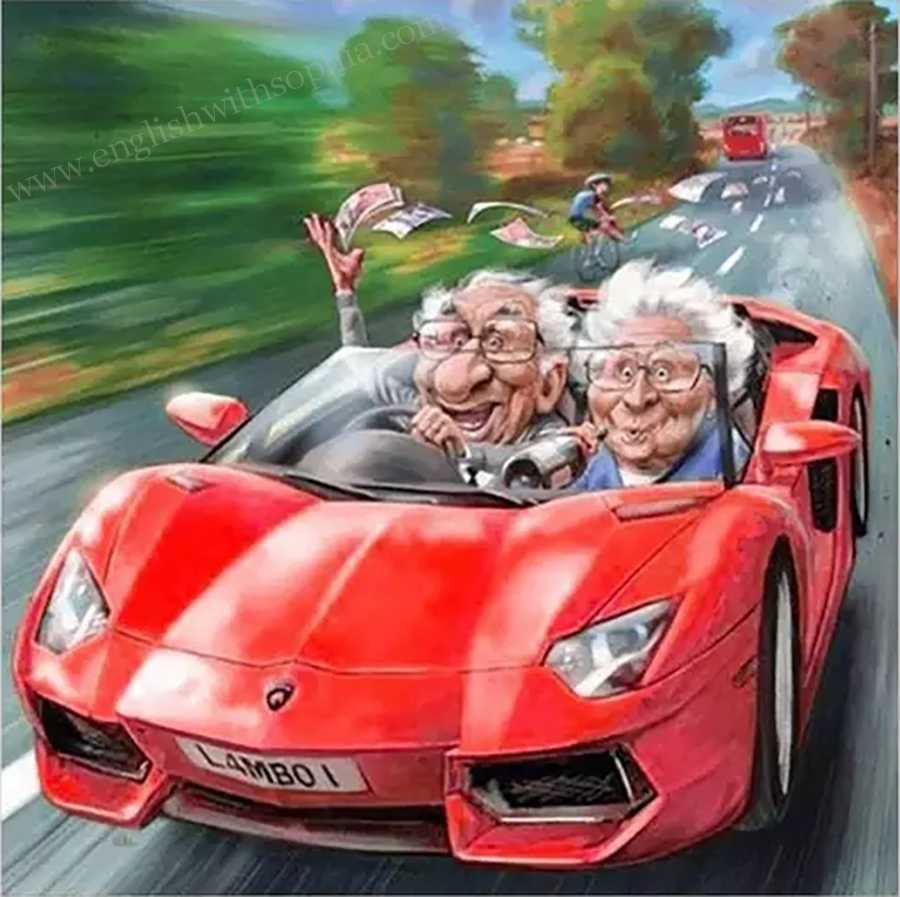Hi, guys! How are you? Ready for learning how to take a drive and strive for fluency in English? Let’s have a look at the words and best expressions to talk about taking a drive!
1.How to take a drive
Are you fed up with hanging around, waiting for buses and trains? They go everywhere, but waiting at that bus stop gets pretty chilly in the winter. Cabs are really convenient, but they sure can be expensive. What’s the perfect solution? Drive!
I know, I know. You may not have a car. The good news is that it’s cheaper to get a license than to get a car. Ha! And although you can’t borrow a driver’s license, you can rent a car. But watch out for those crazy drivers! You’ll need to make sure you know the rules of the road.
Each state has all the information and rules about getting a license on its DMV website. “DMV” stands for Division or Department of Motor Vehicles. The bad news: there is usually a test!
Dialogue How to Take a Drive
LIA: Hi. I’d like to get a New Jersey driver’s license.
DMV WORKER: Do you want to renew a New Jersey license or apply for a new one?
LIA: I don’t have a New Jersey license, but I have my license from my country.
DMV WORKER: You can’t use that here. Do you have an application?
LIA: No, I don’t.
DMV WORKER: You’ll need to fill out an application. Do you have the required picture ID?
LIA: Yes, I do and I have my passport. Do I need anything else?
DMV WORKER: You can check this list of required documents. If you have all the paperwork, you just need to take a vision test and the written test. When that person is finished, you can go to booth number 9 and have your picture taken.
LIA: Yikes! Can I skip the picture? I’m having a bad hair day!
DMV WORKER: Sorry. Our state requires a photo-license.
Rules for getting your license can be different in each state. Before you go, make sure you check what documents you need. It can be very frustrating to wait in line, then find out you don’t have the right documents. You can find out on the DMV website when you check the office hours. This is not a place anyone likes to visit more than once!
It’s a good idea to take a newspaper with you (you can practice reading English). The long lines at the DMV are famous (and not in a good way!). Don’t go on a bad hair day. You’ll be stuck with that license photo for a long time.
USEFUL VOCABULARY
apply: to fill out documents asking to get something
bad hair days: times you just don’t look your best
bad news: unpleasant situation
booth: a small space with a table and, sometimes, a computer
chilly: a little bit cold
convenient: easy DMV: Division of Motor Vehicles (Some states may have a slightly different name, but most use Motor Vehicles in the name.) fed up (also had enough): tired of something
frustrating: annoying, making you angry or upset
GPS: short for Global Positioning System; the signal from a satellite that shows exactly where you are hanging around: just waiting paperwork: forms and documents (ugh!) that must be filled out picture ID: an Identification Document that shows your photograph renew: bring your old license up-to-date
required: necessary skip: omit, leave out stuck with: required to keep vision test: a simple eye test (to be sure you can see that truck behind you!) written test: a test taken in the DMV office to test driving knowledge; usually taken on a computer
2. GIVE ME A RIDE!
So you’d like to take the family for a drive in the country. A train might take you there, but it’s so much easier to see the sights by driving around in a car. Maybe it’s time to rent a car. It’s always a good idea to check many car-rental companies to find the best price. You can search on the Internet or call the company’s 800 number.
What kind of car do you want? You’ll need to decide on a type: economy, midsize, or luxury. You can choose the car that fits your needs. Be prepared to pay more for larger cars. You’ll also need to buy insurance, just in case a bear in the country decides that your compact car is lunch!
Dialogue How to Take a Drive
LIA: Hello. I’d like to rent a car for the weekend.
FRIENDLY RENT-A-CAR: Do you have your driver’s license with you?
LIA: Yes, I do.
FRIENDLY RENT-A-CAR: If you want an economy car, we have a nice compact outside.
LIA: Is it a four-door?
FRIENDLY RENT-A-CAR: No, it isn’t. It’s a two-door, but it has a hatchback. And it has a sunroof!
LIA: Do you have anything bigger and faster?
FRIENDLY RENT-A-CAR: Well, we have a midsized convertible, but the compact is more economical.
LIA: How about a big van? I have a large family.
FRIENDLY RENT-A-CAR: Sure, we have a van. It’s very roomy. It’s the biggest and most expensive of the three.
LIA: Well, I’d like the convertible for myself, but I guess I’ll take the van. Maybe next time…
When you rent a car, you’ll be asked to buy insurance. This is a good idea. If anything happens to the car while you have it, the insurance will pay for any damage. If you use a credit card to rent the car, you may already have insurance coverage. It’s a good idea to check with your credit card company first; you can save a few bucks!
USEFUL VOCABULARY
bucks: dollars
compact: the smallest size car
convertible: a car with a special soft roof that folds completely down (Driving with the top down can be great in the summer—not so much fun in the rain!)
country: far from the city, an area of trees and farms
damage: harm or injury to a person or to a car
economy: having to do with saving money
hatchback: a door at the back that lifts up and out for loading
luxury: very special, with extra conveniences
midsize: a medium-sized car, usually with four doors
rent: pay money to use something for a limited time
see the sights: visit attractions in a new place
sunroof: a window in the roof of the car that can be opened. Be careful in the rain!
van: a very large vehicle that can carry up to 12 passengers
3.OOPS, SORRY, OFFICER!
Oops. What are those flashing lights behind you? Oh, no! Were you careful to watch the speed limit signs along the road? Those flashing lights don’t mean a party this time; they mean the police officer would like to have a little chat with you. Maybe you shouldn’t have rented that fancy car after all.
The flashing lights on a police car usually mean the police officer has noticed a moving violation. If a cop pulls you over, move to the shoulder of the road right away, as safely as you can. Be careful of traffic on the highway! It’s important to be respectful to the officer, even if you’re not sure why he or she is stopping you.
Dialogue How to Take a Drive
STATE TROOPER: Good morning, sir. I pulled you over because the speed limit is 50 miles per hour. You were driving much faster than that. You were doing 70.
ALAN: I’m sorry, Officer. I didn’t notice the sign, but I thought I was driving slower than that.
STATE TROOPER: I need to see your license and registration.
ALAN: I don’t have my license with me. I think I left it home.
STATE TROOPER: You need to have a license and registration with you in the car at all times, sir. I am going to issue you a ticket for speeding and another one for not having the proper documents. You can call the clerk’s office to find out the amount of the fines.
ALAN: Can I just pay you now?
STATE TROOPER: Sir, police officers aren’t allowed to take money. You have to call the clerk’s office. You can go there to pay in person, or you can mail it in.
ALAN: This is my first speeding ticket.
STATE TROOPER: Have a nice day, sir.
Know what documents you need to keep in your car.
If a police officer pulls you over, don’t get out of the car. Wait for the police officer to come to your window.
USEFUL VOCABULARY
allowed: permitted
chat: a casual conversation
cop: police officer
fine: the amount of money you must pay for certain violations
flashing: shining brightly on and off, very quickly
in person: going yourself to do something directly
issue: give out
moving violation: a motor vehicle law that’s broken while driving, such as speeding
notice: see
Officer: the respectful title for a policeman or policewoman
pull over: move the car to the side of the road
registration: a document showing The owner of a car
shoulder: space on the side of the road, usually marked by a line, where a car can park if there’s a problem
speeding: going faster than the speed limit. This is a no no!
State trooper: member of the state police force
ticket: a document showing a road law you’ve broken; it requires payment of a fine
tough: difficult
traffic: a lot of cars in the same place on the road
MORE FUN WITH IDIOMATIC EXPRESSIONS: Cars
get a lot of mileage out of something: be able to use something for a long time Even after five years, the sweater looked great. She was happy she got a lot of mileage out of it.
road hog: a driver who takes up space in more than one lane on a road She knew she would be late when she got stuck driving behind a road hog on the way to work.
get the show on the road: get started with something He spent the whole day packing for his trip, and now he just wanted to get the show on the road.
traffic jam: many cars stuck on a road without being able to move He didn’t care about being stuck in the traffic jam; he was happy to listen to his new CD.
lemon: a car (or another item) that continues to have problems even after it’s been repaired many times He was nervous about buying a used car from a stranger. “With my luck,” he said, “I’ll get a lemon.”
Hope now you can express yourself with confidence when taking a drive! Go on learning about the Use of English and about passing your First Certificate Exam with flying colors!
Likewise, check my FB page or my TeachersPayTeachers store, where you will find all sorts of pieces of advice and resources.



Comments are closed